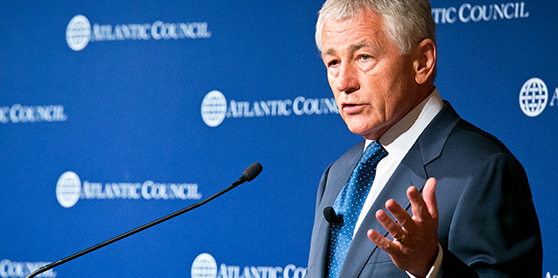
President Obama has just announced the nomination of Senator Chuck Hagel, the chairman of the Atlantic Council, to be the 24th Secretary of Defense.
If Hagel survives the nomination fight in the Senate—and I believe he will—he’ll be the second consecutive Atlantic Council chairman to leave for the Obama administration. His predecessor, General Jim Jones, was of course Obama’s first National Security Advisor. As with Jones, the Council’s loss is the country’s gain.
Hagel is my boss’ boss, so my endorsement will carry even less weight than it normally might, but his credentials for the job don’t require embellishment. A twice-wounded Infantry veteran of the Vietnam war, he would be the first Pentagon boss to have seen combat as an enlisted man.* As number two man in Ronald Reagan’s Veteran’s Administration and later CEO of the USO, he’s fought for those who fought for their country. A very successful business career will be a useful background for managing a 600 billion dollar agency through downsizing. As two-term Senator from Nebraska, Co-Chairman of the President’s Intelligence Advisory Board, Member of the Secretary of Defense’s Policy Board, and chairman of a foreign policy think tank, he’s spent years working on global challenges.
That someone with that background is a controversial nominee is a sign of how tragically poisonous American politics has become. Ironically, his biggest assets for the job—his penchant for putting his country above his party and his willingness to tell hard truths regardless of the political fallout—are precisely why he has a hard fight ahead of him. The NBC News First Read team gets it exactly right:
Hagel’s biggest obstacle to confirmation isn’t his controversial comments about Iran and Israel or his “overly aggressive gay” remark. Rather, it’s that he’s a man without a party. If Hagel were a Democrat, for instance, you would have seen someone like Sen. Chuck Schumer (D) embrace his potential nomination on “Meet the Press” recently instead of being tepid about it. And if Hagel were a true-blue Republican—having campaigned for Mitt Romney and other GOP candidates last fall—you wouldn’t have seen folks like Sen. Lindsey Graham (R) speak so critically of him. But Hagel’s in no-man’s-land territory, the place where the public says it wants many public officials to be, but where Washington can eat folks like this alive. He’s a Republican who later opposed the Iraq war, whose wife endorsed Obama in ’08, and who campaigned for Democrat Bob Kerrey in 2012. In recent times, every cabinet nominee from the opposition party (Bill Cohen, Norm Mineta, Bob Gates, Ray LaHood) has sailed through easily. But since we started covering politics, Hagel might be the first cabinet nominee from the opposition party who doesn’t have the backing from that party. It’s amazing how things can change: Republicans universally support John Kerry for Secretary of State, but oppose Chuck Hagel for Defense.
Alas, in politics as in religion, there’s far more tolerance for those with widely divergent beliefs than for apostates.
Despite serving in the cabinet of conservative icon Ronald Reagan, being elected twice to the Senate from a state that’s been red in every election since 1964, and a lifetime American Conservative Union score of 84, Hagel was all but read out of the Republican Party.
Back in 2007, then-Vice President Dick Cheney declared, “it’s very hard sometimes to adhere to [Reagan’s “11th Commandment” against speaking ill of a fellow Republican] where Chuck Hagel is involved.” The cause for the enmity was his turn against the Iraq War, at the time the key litmus test for Republican Party loyalty.
Hagel had ultimately voted for the Authorization to Use Military Force, giving President Bush Congressional backing for the war, but had warned in 2002 that “American people must be told of the long-term commitment, risk and cost of this undertaking … [and] not be seduced by the expectations of ‘dancing in the streets’ after Saddam’s regime has fallen.”
In hindsight, he was of course right. The initial jubilation over the toppling of Saddam’s statue soon gave way to a messy civil war. By the summer of 2005, Hagel saw too many parallels to the war he and his brother had fought and decided to put his loyalty to American troops in harm’s way over his loyalty to his president and his party, stating “To question your government is not unpatriotic—to not question your government is unpatriotic.”
Many principled conservatives agreed. Back in March 2007, then-ACU Chairman David A. Keene told the Washington Times, “He may be right or wrong on Iraq, but no one can question his base conservatism or his devotion to a strong United States.” But, of course, many did anyway.
Hagel went on to commit additional heresies, including serving as a defense and intelligence advisor to President Obama. As Jon Huntsman, a popular two-time governor of arguably the most conservative state in the Union and also a former Reagan administration official, learned, that’s an unpardonable sin in today’s climate.
Similarly, it’s not hard to see why Hagel would back a moderate Democrat who’s a good friend and Navy SEAL who lost a leg while earning the Medal of Honor in a war they both fought in over a Tea Party Republican. But, in this town, party is supposed to trump everything.
James Joyner is managing editor of the Atlantic Council. These views are his own.
________________
*Cap Weinberger and William Perry were both briefly enlisted men before getting commissioned. Weinberger was an officer by the time he shipped off to war and Perry served in peacetime.
